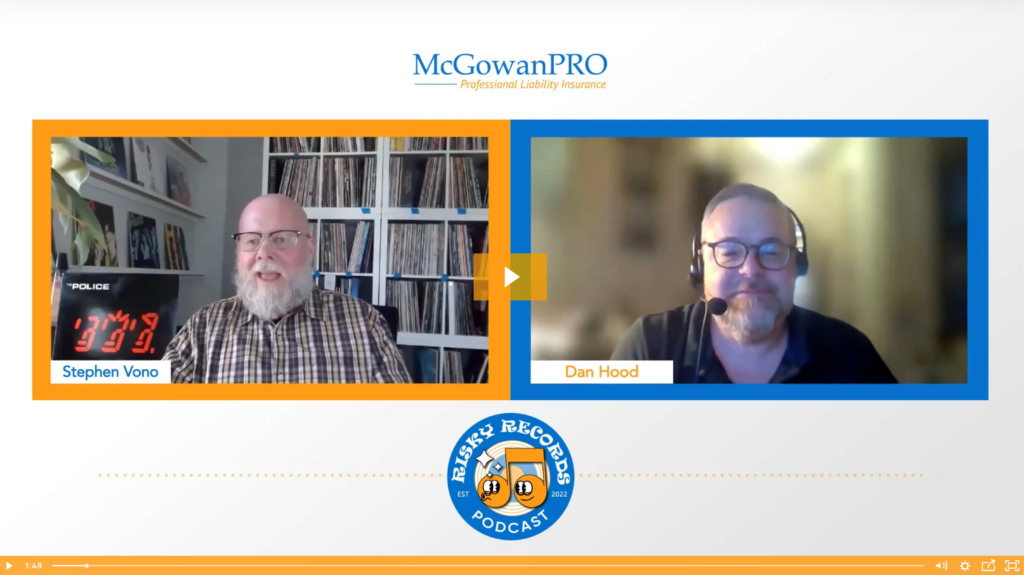In this episode of Risky Records, I spoke with the Editor-in-Chief of Accounting Today, Dan Hood, to get his perspective on the technology risk environment that accountants work in today. (Read to the end to see Dan’s album recommendation.
Emerging technology risks for accountants
The technological breakthroughs of the past few years, including remote work and AI automation, have put accounting firms in a precarious position. Firms must find new ways to manage technology risks or face becoming irrelevant. Dan pointed out that commoditization is an enormous peril in the accounting market. For example, tax prep firms may soon face fierce competition from AI-powered tax services. Dan warns, “Basically, all tax returns will eventually be able to be done by AI or some kind of advanced computer system. There’s no reason they can’t…It’s a straightforward set of rules applied to a set of data.”
As auditing functions become increasingly automated, accounting firms may also lose out on some basic compliance work that serves as regular, bread-and-butter income. Interestingly, as we discussed, technology is not only the cause of many risks but also a means of managing and mitigating technology risks.
The risk of not adapting
One key area of technology risk management is not embracing new technology. He said, “The risk is, on the one hand, all this compliance work getting commoditized and potentially taken away. On the upside, the risk of missing out on all these opportunities for advisory services and more value-added services enabled by technology [is real].”
However, CPAs can utilize AI and other technology tools to become more efficient and generate new service offerings. For example, data analysis is a low-hanging fruit for many firms. Dan elaborated, “Think of what you could do with a business’s financial data and the way you can run it through benchmarking systems and all sorts of analysis systems to find out ways they can operate their system better. Save more on payroll, save more on supplies, their supply chain, all kinds of opportunities for savings, but then also, all kinds of opportunities for growth.”
I pointed out (and Dan agreed) that over-relying on technology solutions is also a risk. The accountant needs to review the work being generated by the technology. Your added value as an accountant is expertise, and you must ensure the work is correct for compliance and general accuracy.
The critical thing to get over is the idea that AI will “take your job”. What AI will do is remove specific tasks. Entrepreneurial CPAs must embrace the technology and learn how to use it to benefit their firm.
Also read: Beneficial Ownership Information Reporting: How to Stay Compliant
Retaining talent and staffing shortages
An indirect risk surrounding technology that CPAs must manage is staffing shortages. Dan commented, “There’s a straightforward risk of, ‘yeah, you’re not going to be able to get your work done’. Because competition for staff is so fierce, you have the risk of losing people on a regular basis. People are constantly being poached by other accounting firms that are willing to pay them a little or, in some cases, a lot more.”
Not only is technology causing these staffing shortages through poaching and remote work opportunities, but it also offers several solutions to the problem. Dan recommends outsourcing and hiring non-CPAs to handle routine tasks and project management. “There’s lots and lots and lots of work that accountants do that doesn’t require a CPA or even a background in accounting, right?”
Avenues such as virtual assistants or outsourcing platforms offer CPAs a shortcut to offloading non-accounting work and become much more efficient.
Also read: The Nuances of Virtual Currency Tax
Making your firm attractive to potential buyers
The accounting landscape is undergoing a rapid transformation due to mergers and acquisitions. Technology has dramatically sped up the acquisition process. Private equity firms are acquiring family offices and smaller firms, which has led to two significant risks. Firstly, there is increased competition for local firms. Secondly, many people have a misconception that selling a firm is a straightforward process. Firm owners look around and see the constant stream of acquisitions and think that selling their firm is a given.
Dan weighed in, “ I think it’s messing with people’s heads in the notion that they think they can sell their firm no matter what.” In reality, selling a firm is much more complex than simply wanting to retire.
At McGowan Pro, we can help make your firm more attractive to buyers. Private equity firms can aggressively acquire practices, creating both opportunities and challenges. Small firms can still attract buyers if they are forward-thinking and have the right strategies. It’s crucial for firm owners, especially those nearing retirement, to stay engaged and take advantage of potential opportunities.
Mitigating technology risks for accounting firms
Technology is both causing risk and creating tools to manage that risk for accounting firms. No matter your goals–whether seeking to sell your firm or get a handle on technology risk management–McGowan PRO has the experience to guide your firm across the finish line.
Contact me directly or one of our expert agents to learn more about how we can help.

P.S. Dan chose the classic Police album Ghost in the Machine from my album collection. For more on why, watch the video above (the conversation starts around 30:39).

